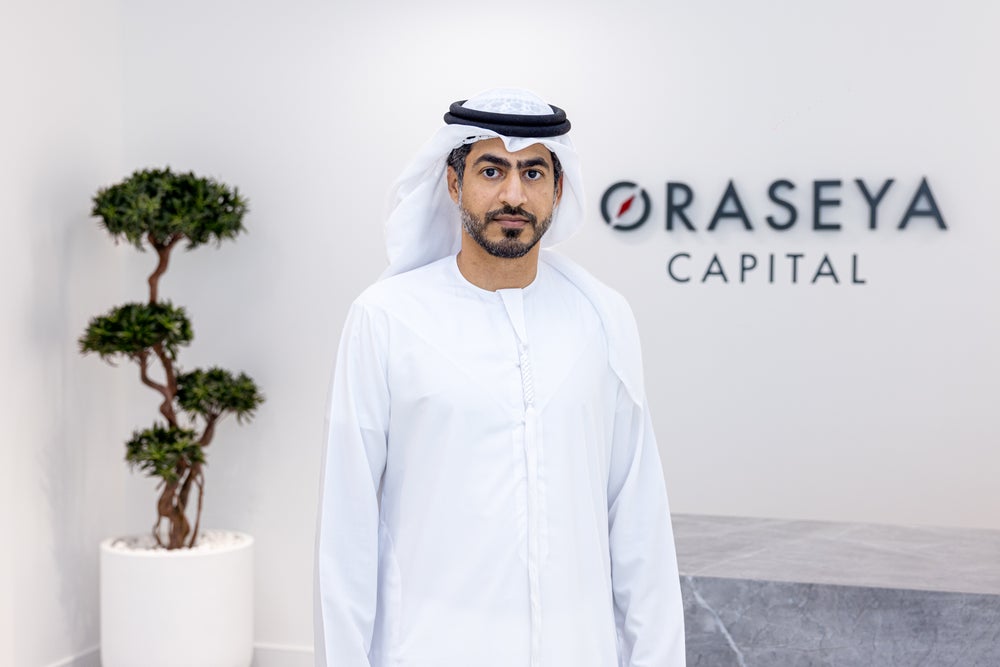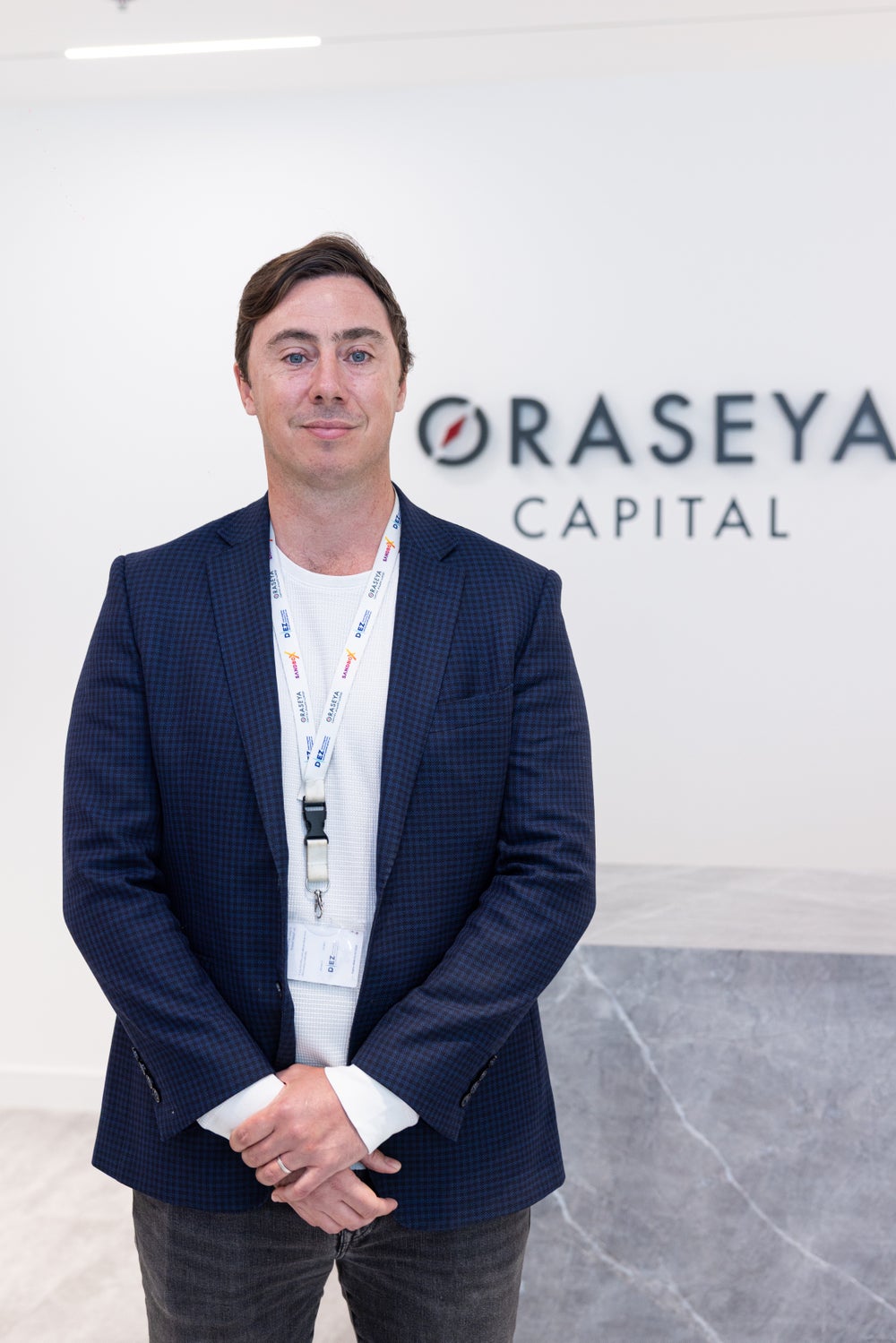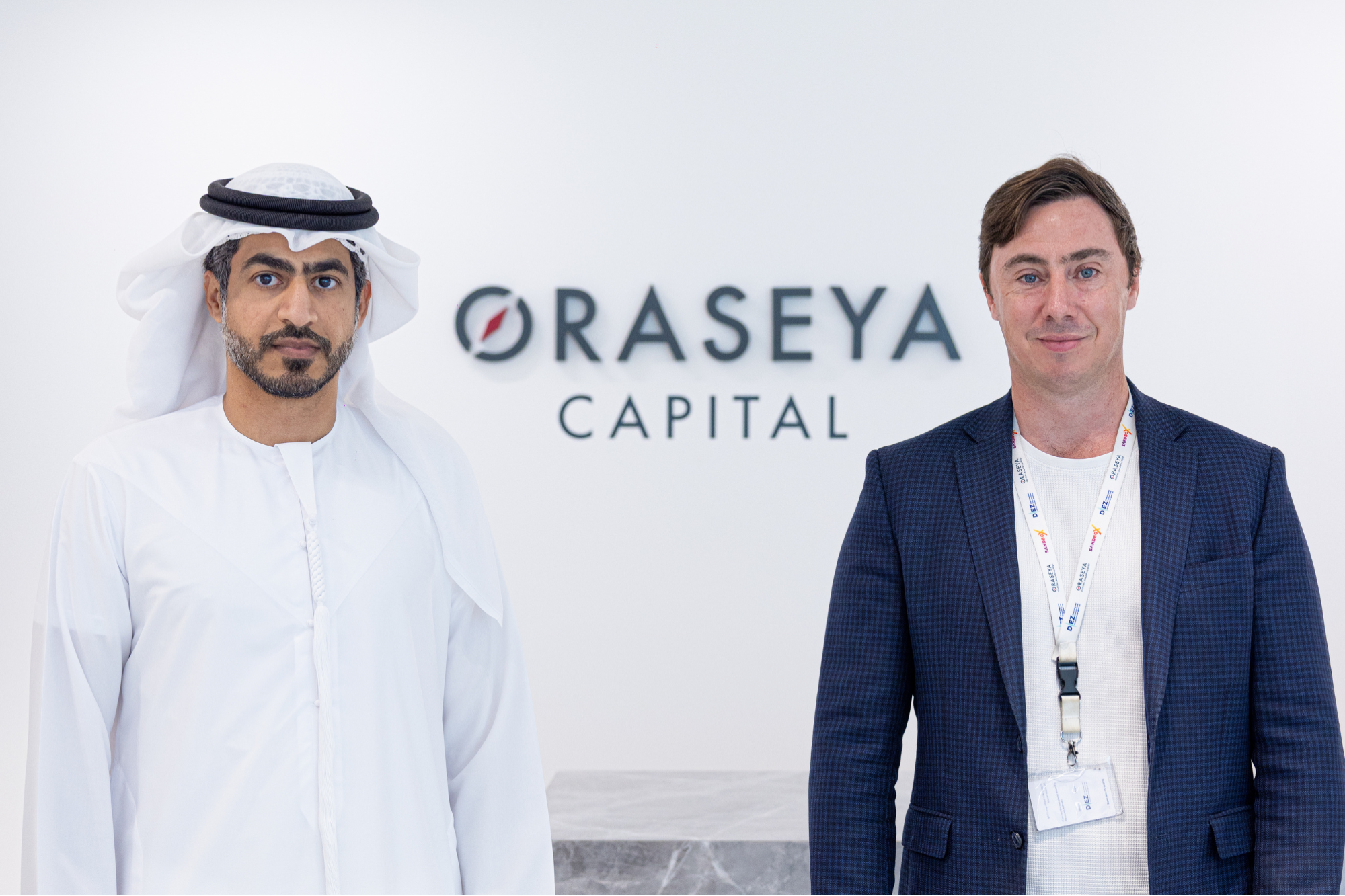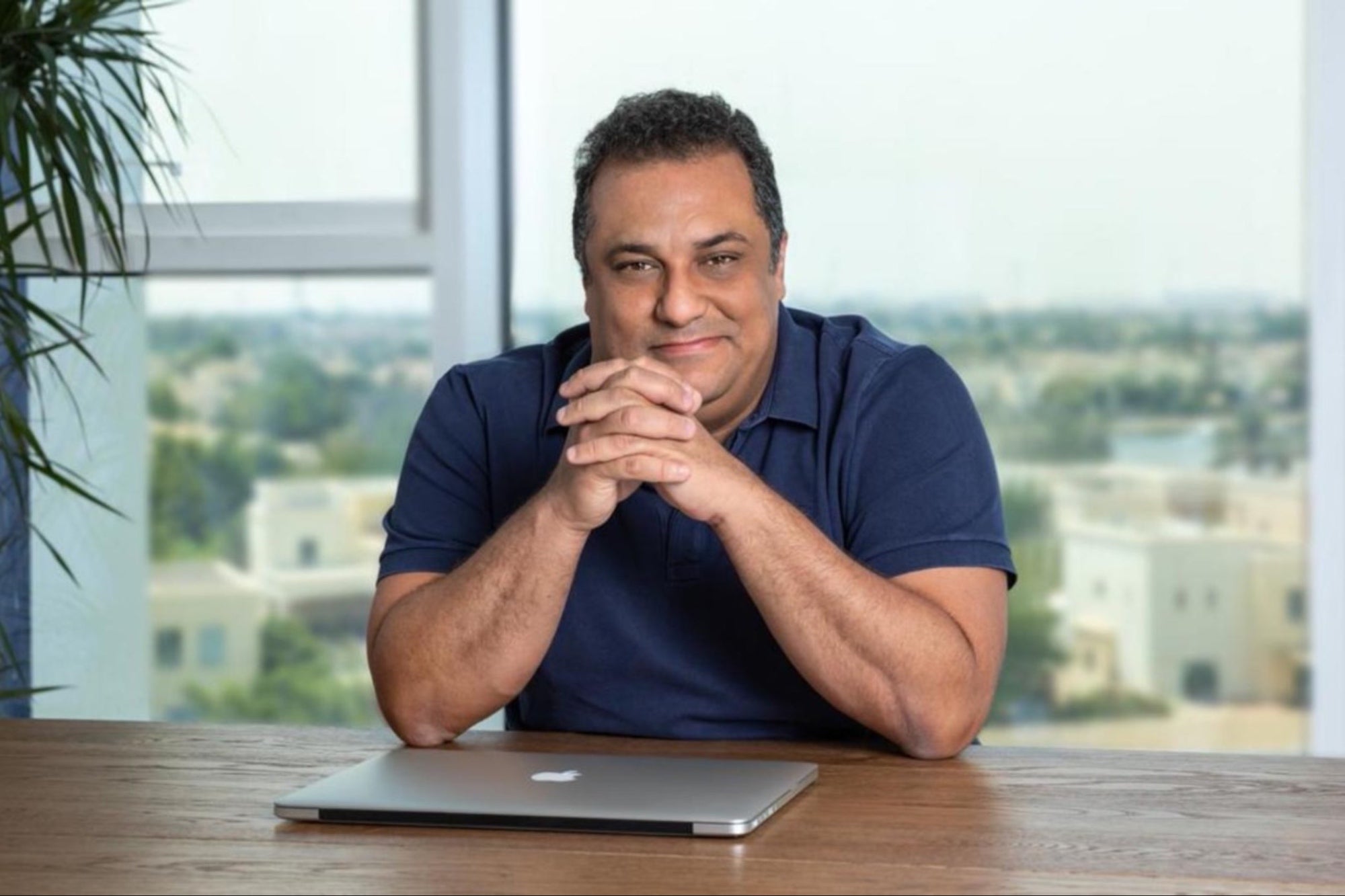Opinions expressed by Entrepreneur contributors are their own.
You're reading Entrepreneur Middle East, an international franchise of Entrepreneur Media.
In early 2025, just a few months after completing one full year of operations in the region, UAE-based venture capital (VC) firm Oraseya Capital was revealed to have been the most active investor by number of deals in the UAE in 2024, in a study by data and analytics platform MAGNiTT. The same report showed that Oraseya Capital –the investment arm of the Dubai Integrated Economic Zones Authority (DIEZ)– had been the second most active Series A investor in the broader MENA region that same year. But rather than investing in the business ideas alone, Oraseya Capital Partner and DIEZ Vice President Hassan AlFarsi emphasizes right from the beginning that the VC firm "invests in ambitious founders building regionally and globally scalable companies."
"We currently have a growing portfolio across B2B software as a service (SaaS), fintech, artificial intelligence (AI), edtech, e-commerce, and future-of-work solutions," AlFarsi reveals. "In 2024, our first year of operations, we closed 24 investments. We are expecting a similar number of investments in 2025, closing some landmark investments including Ziina, Nymcard, Calo and a number of early-stage ones. We are sector-agnostic by design, because we believe innovation often emerges at the intersection of disciplines. That said, we tend to back companies with strong technology or platform foundations. At the same time, we also back startups with a nexus to the UAE — whether by market, operations, or impact — addressing meaningful pain points faced by individuals or businesses in the region. We invest from Pre-Seed to Series B; roughly 80% of our fund is allocated to Seed through Series B, with typical check sizes ranging from US$500,000 to $3 million. When it comes to earlier stages, we deploy capital through our in-house SANDBOX program, which enables us to run high-quality diligence at scale and support promising founders early in their journey through a structured and founder-centric environment."
Creating such an environment is largely rooted in Oraseya Capital's vehement "founder–VC fit" approach. "It matters more than people often realize," says Julien Plouzeau, who is also a Partner at Oraseya Capital and has been a part of the UAE startup ecosystem since 2012. "It's about shared values, mutual respect, and being aligned on ambition, pace, and long-term vision. The strongest founder–VC relationships are built on trust and transparency. It's not about control or oversight — it's about creating a space where the founder feels genuinely supported. Where hard conversations can happen, and where both sides are committed to helping the company succeed — not just to meeting short-term metrics. That's why we're highly intentional about who we back — and we hope founders are equally selective about the investors they bring on board. When the fit is right, the partnership becomes a real asset to the company — especially in the moments that matter most."
 Hassan AlFarsi is a Partner at Oraseya Capital and Vice President of DIEZ. He has been actively involved in the startup scene since 2014 through advisory and investments. Image courtesy Oraseya Capital
Hassan AlFarsi is a Partner at Oraseya Capital and Vice President of DIEZ. He has been actively involved in the startup scene since 2014 through advisory and investments. Image courtesy Oraseya Capital
Just like Plouzeau, AlFarsi's endeavors at Oraseya Capital don't mark his first rodeo in the world of startups and investments– with over 15 years of experience in finance, he's also been actively involved in the UAE's entrepreneurial ecosystem since 2014. With all the experience he's thus amassed, AlFarsi has made one crucial observation about the UAE and the wider region's investment space: funding stages in the MENA region aren't necessarily demarcated as clearly as they are in other geographies. "The lines between Pre-Seed, Seed, and Series A are often blurred, and founders are usually expected to show more tangible progress — especially when it comes to traction and metrics — than their peers in other geographies," he notes. "Rather than rigidly adhering to stage labels, we assess each opportunity based on the startup's level of maturity and readiness. At the Pre-Seed stage, we focus on founder clarity, technical strength, and whether there's an early signal of real market need. For Seed, we look for initial validation — some paying users, a credible go-to-market plan, and early team development beyond the founders. Series-A is typically where companies need to demonstrate that growth is not just happening but can scale in a repeatable and capital-efficient way. By Series B, it becomes a question of operational discipline, healthy unit economics, and a convincing case for market leadership, ideally beyond just the local geography."
But as Plouzeau notes, much of this intertwining of growth stages and investment-readiness has to do with the impressive pace at which MENA founders have upskilled and matured. "Founders' mindsets have certainly evolved significantly over the past few years," Plouzeau says. "Today's founders are far more ambitious and global-first, designing products and business models with regional or international scalability in mind from day one — not just local market fit. They're also more data-driven and capital-efficient. Growth at all costs has been replaced by a sharper focus on unit economics, sustainable expansion, and clear paths to profitability."
This trajectory isn't one that is evident solely through Plouzeau or AlFarsi's personal observations, of course– the statistics that prove the MENA propelling into entrepreneurial success are endless. For starters, the UAE was ranked world's #1 global destination for entrepreneurship for the fourth year running in the Global Entrepreneurship Monitor 2024–2025 report, outperforming 11 out of 13 key high-income country indicators, including access to finance, supportive policies, infrastructure, and school-to-work integration. In the Global Startup Ecosystem Index 2025 by StartupBlink, Saudi Arabia ranked second in the region, with a mammoth ecosystem growth of 236.8%, becoming the only country globally to exceed 200% growth among the top 100 ecosystems in the report.
Quietly keeping up with, what can only be described as, this giddying pace of growth have been the investors in the region. "On our side as VCs, we've adapted accordingly," Plouzeau reveals. "We now place greater weight on fundamentals — resilient business models, thoughtful go-to-market strategies, and disciplined financial planning — rather than purely top-line growth. Another key shift is the rapid integration of AI tools by founders. Whether it's speeding up product development, automating repetitive tasks, or supercharging go-to-market (GTM) execution with lean teams, AI is enabling early-stage startups to do more with less — and at a faster pace than ever before."
Indeed, the AI-driven growth being witnessed across the region, and the world, is one that has marked uncharted territories for both founders and investors alike. "It is undeniably the most transformative technology of our time — and as investors, we're only beginning to tap into its potential," Plouzeau notes. "On the upside, AI is becoming the engine of future progress, comparable to the early days of the Internet, progressively becoming a foundational layer of business operations. We see clear signals of how central AI is becoming across functions — from strategy and product to customer service and operations. We're also seeing how AI is dramatically accelerating software development. Developers today are harnessing AI tools to prototype, build, and ship products at unprecedented speed — cutting down both cost and time-to-market. What once took a team of engineers can now be achieved by a single founder equipped with the right tools. It's the rise of the "10x developer" effect, where one person, amplified by AI, can operate at the velocity and output of an entire team. This shift is also powering a new wave of agile founders who are "vibe coding" their way to market — rapidly experimenting, building, and iterating using wrappers, agents, and open models. With AI as their co-pilot, they're able to test ideas and launch products at a pace that was unthinkable just a few years ago."
 Julien Plouzeau is a Partner at Oraseya Capital, spearheading the investments across all stages and managing the fund's portfolio.
Julien Plouzeau is a Partner at Oraseya Capital, spearheading the investments across all stages and managing the fund's portfolio.
But with such speed and accessibility come unique challenges, reiterates Plouzeau. "The pace of change creates volatility — what's cutting-edge today might be outdated tomorrow, making it harder to bet on the "winners" and to assess long-term defensibility," he says. "Lower barriers to entry mean more noise and more competition, which makes identifying true moats a real challenge in the AI space. There are also serious concerns around data security and regulatory clarity. As AI systems become deeply embedded into workflows and rely on sensitive data, compliance becomes critical."
As such, Plouzeau notes that at the intersection of technology-driven innovation, meaningful social impact and founder-VC fit lies an onus on the investors to not just keep up with the game but also lead it. "The acceleration of technological change means that innovation cycles will no longer unfold over decades — they'll happen in a matter of years," he says. "As a result, identifying truly transformative trends will require deeper conviction, faster learning, and a stronger ability to filter signals from noise. This will make venture investing both more challenging and more rewarding. AI is already reshaping how we work as investors. From conducting due diligence and market research to drafting memos and tracking performance, we're leveraging AI tools to work more efficiently and uncover insights faster. But beyond operational efficiency, AI is also redefining the type of companies we back — and how we assess their defensibility, team dynamics, and ethical implications. At the same time, the growing focus on sustainability and impact will continue to shift our priorities. As VCs, we'll be expected to back companies that not only scale but also contribute meaningfully to the world around them. That means seeking out founders who are mission-driven, building businesses that are resilient, inclusive, and future-conscious. In short, the VC of tomorrow won't just be a capital allocator — we'll need to be system thinkers, ecosystem builders, and long-term partners to the next generation of AI-first founders."
AlFarsi too reflects Plouzeau's sentiments. "Venture capital has a vital role to play in accelerating the transformation of our region's economy — not just by funding startups, but by bridging critical gaps that exist between ideas, talent, technology, and the market," AlFarsi says. "When we invest, we're backing more than a business — we're enabling solutions that address real pain points faced by individuals, businesses, and entire industries. Whether it's improving access to healthcare, streamlining financial infrastructure, or helping SMEs digitize, these innovations unlock efficiency, opportunity, and impact at scale. In doing so, VC funding fuels job creation, strengthens infrastructure, and supports long-term economic resilience."
As the team at Oraseya Capital roll up their sleeves to end yet another year on a strong note, AlFarsi concludes with a simple reminder that brings to the forefront the very reason VCs and investors exist in the first place. "There's a powerful flywheel effect: every successful startup story inspires others to dream bigger; capital breeds confidence," he says. "When a founder receives investment, it's not just about the funding — it's a validation mechanism that signals market readiness, attracts talent, and opens the door to partnerships and expansion. As VCs, we also bring governance, discipline, and structure to early-stage companies — helping them scale with strong foundations and sustainable practices. The more we do this across the ecosystem, the more bold ideas will emerge — and the stronger our regional innovation economy becomes."
'TREP TALK: Hassan AlFarsi shares advice to founders working to grow their startups while navigating multiple funding rounds
Don't build for the next round — build for the long haul. "Early-stage founders often over-index on dilution, but the priority should be securing enough capital to build real momentum. As long as you're within a reasonable dilution range, what matters most is putting your company in a position to reach meaningful milestones. Future investors can help clean up the cap table if needed — but they can't rewind lost time or missed opportunities."
Develop a deep command of your metrics "Look at not just revenue, but how customers engage with your product, what keeps them coming back, and where the friction lies. Strong founders treat metrics as a compass, not a report card. Ultimately, it's your ability to operate with focus, agility, and customer empathy that will shape your trajectory — far more than the perfect pitch deck or optimized ownership structure."
Above all, stay true to who you are "Your unique perspective, your team's chemistry, and your lived experience with the problem you're solving — that's your real competitive edge. The most exceptional founders we've partnered with didn't follow hype cycles; they followed their conviction. They built with depth, not noise — and that authenticity translated into products that truly mattered."
'TREP TALK: Julien Plouzeau shares some common mistakes that startup founders make when fundraising and how can they be prevented
Failing to clearly articulate why you, why now. "It's not just about the product — it's about the founder's unique perspective, their edge, and the urgency of the opportunity. Too often, pitches dive deep into features or long-term vision but miss the mark on communicating founder–market fit or why this specific moment creates a window for disruption."
Overlooking the power of transparency. "Building investor trust isn't just about showing traction — it's about showing clarity. A clean, well-structured data room and the willingness to speak openly about risks, challenges, and trade-offs go a long way. At Oraseya Capital, we gravitate toward founders who are candid, self-aware, and realistic about their competitive landscape. Confidence is important — but humility and honesty are often what seal the partnership."
Timing matters — and not just market timing, but relationship timing. "Some of the most compelling rounds we've led were with founders who nurtured the relationship early, well before they were actively raising. They kept us in the loop, shared wins and setbacks, and built conviction over time. Fundraising isn't just a transaction — it's a long game built on trust, and the earlier that journey starts, the stronger it ends."

 Hassan AlFarsi is a Partner at Oraseya Capital and Vice President of DIEZ. He has been actively involved in the startup scene since 2014 through advisory and investments. Image courtesy Oraseya Capital
Hassan AlFarsi is a Partner at Oraseya Capital and Vice President of DIEZ. He has been actively involved in the startup scene since 2014 through advisory and investments. Image courtesy Oraseya Capital Julien Plouzeau is a Partner at Oraseya Capital, spearheading the investments across all stages and managing the fund's portfolio.
Julien Plouzeau is a Partner at Oraseya Capital, spearheading the investments across all stages and managing the fund's portfolio.











